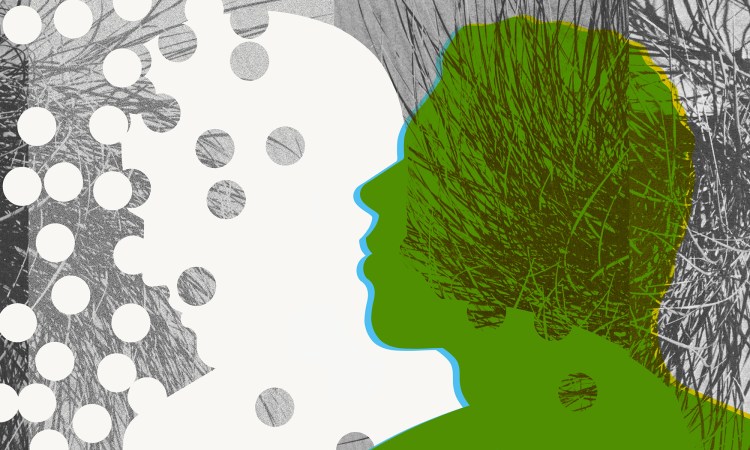
As humans, we spend a good amount of time thinking about what other people think.
Although this is not meant to be a controversial proposition, I am sure some of you are saying to yourselves, “No, I don’t do that,” or “I don’t care what other people think.”
This is understandable. Any opposition you might feel to this statement may stem from well-meaning advice givers, who in an effort to direct you away from self-criticism and anxiety, have assured you that what other people think of you does not matter.
To that I will say simply, “Yes, it does,” and urge you to read on as I explain why.
As toddlers, we don’t consider our effects on other people. We make demands, cry and throw tantrums, wanting only to satisfy our own needs.
I’ll begin with a statement that we should all be able to endorse easily: When we act, it is likely and appropriate that we would think about how our actions affect others. For example, we think, “What does X think about what I just said?” Still, our thinking about others’ thoughts can also get more complex. We can widen our scope of inquiry by focusing on what someone thinks about the way we feel about someone else (e.g., “What does Y think I feel about X, considering what I just said?” or “What does Y think X feels about me, considering what I just said?”).
These are not necessarily negative or maladaptive thoughts.
Quite to the contrary, these are complex ways of thinking — employed by the most socially skilled among us — to help us develop and maintain social connections. Although important, this way of thinking is not inborn; it is a sophisticated and critical skill we hone over our lifetimes.
As toddlers, we don’t consider our effects on other people. We make demands, cry and throw tantrums in an egocentric way, wanting only to satisfy our own needs and not caring about anyone else. It is only as we learn more about the world, when we develop something called “theory of mind” between the ages of about three to five, that we begin to recognize that other people have thoughts and feelings, and that our actions might affect them. By definition, the theory of mind is an ability to understand that both you and others have mental states and that others’ mental states might be different from your own and even different from what is reality.
This understanding of one’s own mental states gives individuals great power because once you realize you have thoughts and feelings, you can learn to control those thoughts and feelings. One of my favorite stories about the power that this skill affords comes from one of my university colleagues and a conversation he had with his daughter while driving her to preschool:
“Dad, do you know what I’m thinking about?”
“No, Claire, what are you thinking about?”
“I’m thinking about Christmas.”
“Very nice, Claire.”
A few minutes later . . .
“You know what I’m thinking about now, dad?”
“No, Claire, what are you thinking about?”
“Now, I’m thinking about Halloween,” Claire said with a smile.
As a preschooler, Claire not only showed her dad that she had theory of mind but also demonstrated an impressive mastery of directing those thoughts to control her own internal world.
Many of us find it difficult to shift our cognitive energy away from the past events that vex us and toward the things that give us joy.
I contend that this is the skill that the advice givers are trying to get you to develop. Essentially, they are not saying, “Don’t think about what other people think,” which would be almost impossible for those of us over the age of five who have even a bit of empathy. Rather, they are saying, “When you think about what others think, use it for its potential good and then dispose of it,” in a Marie Kondo kind of way.
Considering the average human has more than 6,000 thoughts per day, this type of cognitive purging would likely do us good, freeing up our mental resources for more positive thinking. But just like ridding our homes of unwanted items is a challenge for many of us, so is ridding our brains of unwanted thoughts and feelings. Particularly for those prone to anxiety and depression, worry and rumination — or stewing on negative thoughts associated with past events — is common and maladaptive.
Worry and rumination are also predicted by verbal intelligence, meaning that the smarter we are (in a verbal sense), the more likely we are to have a ruminating and worrying mind. This is why many of us find it difficult to shift our cognitive energy away from the past events that vex us and toward the things that give us joy. Adding more fuel to embers of worry and rumination, the current landscape of technology-mediated social communication makes it especially difficult because of the mostly permanent nature of our digital steps.
Thirty years ago, when we self-evaluated our effects on others, we relied on imperfect and quickly fading memories of events to help fill gaps in our perceptions. Luckily, the mind can be
forgiving to the self, forgetting some damning details of past events and remembering the most promising via a pronounced positivity bias — a trick of memory that allows us to maintain
our self-esteem, ego and positive outlook.
Today’s world of computer-mediated interactions is much less forgiving. Social interactions are often recorded permanently in messages and pictures that one can go back to view and review.
This tendency to better remember positive details over negative ones may be particularly pronounced in the Pollyannas among us. According to the Pollyanna principle, people in general have a tendency to recall more pleasant than unpleasant details. And those of us who do this the most also rate ourselves highly on happiness and optimism.
So happy, optimistic people tend to remember happy, optimistic details. But what about when they don’t have to rely solely on their memory? What happens then?
Unfortunately, today’s world of computer-mediated interactions is much less forgiving, and optimism can’t help you erase black-and-white realities. Social interactions are often recorded permanently in messages and pictures that one can go back to view and review repeatedly.
In contrast to face-to-face interactions and phone calls, many digital communication channels — such as text message or email — are rated highly on a measure called persistence, meaning the communication that occurs over these channels is perceived to be relatively permanent.
How many times have you looked over an email or text message you’ve sent, rereading it to see if you said what you wanted to say in the way you wanted to say it? Ever sent a follow-up message correcting yourself? Clearly, some of us stew on and regret messages we’ve sent.
Letting go of others’ thoughts and our own online missteps might be especially difficult if our thoughts concern our close social connections, which are essential to our feelings of belongingness and love. This too is a natural human inclination, which can be best understood within two larger theoretical frameworks.
First is Albert Bandura’s social learning theory, which suggests that we do not become who we are in a vacuum. Rather, we are influenced by those around us.
From the time we are babies, we watch and mimic others. We learn vicariously from the ways that others are rewarded and punished, and we adapt our behaviors so we can maximize rewards and avoid punishment. Hence our social contexts matter, and approval and disapproval from others shapes our future behavior. It is a basic tenet of human learning.
Caring about what people think is a protective process, designed to help us build a net of belongingness and safeguard us against the loss of love.
Meanwhile, the importance we attach to this approval is related to another theory, Abraham Maslow’s hierarchy of needs, a pyramid reflecting human motivation toward an actualized self, with rungs depicting basic human needs.
Right above physiological needs (like food and water) and safety needs (like a stable job and place to live), humans have a need for love. As children, these needs are often satisfied by a small number of people, usually family members, but as we spend more time in public spaces with peers and other agents of social influence, our need for love and belongingness expands to fill these spaces.
Framed in accordance with this theory, caring about what people think is a protective process, designed to help us build a net of belongingness, which includes even distant connections, and safeguard us against the loss of love from those with whom we share our closest bonds.
Assuming that you’ve now embraced the idea that you do think of others’ thoughts and feelings and that is a good thing, I want you to direct your attention toward the people whose thoughts consume most of your time in a relative sense. The amount of time you spend thinking about another’s thoughts might be inversely related to their distance. You may spend time thinking about the thoughts of people who aren’t among your closest connections. Why might this be?
Uncertainty reduction theory — which suggests that individuals have a need to reduce uncertainty about other individuals in order to build relationships — likely accounts for much of this phenomenon. It is not only exceptionally difficult to discern the thoughts and motivations of those who are distantly connected to us.
But the uncertainty related to ghosting is not what really causes us pain.
What’s more, since these are our loosest connections, we might spend more time analyzing our interactions with them because we are most uncertain about how they think and feel. It’s also the reason we feel unease when we are left on read or ghosted in response to our social overtures.
Ghosting hits humans at one of our most vulnerable weak spots: Our desire to know. We have a need for closure. We want to know how things end. We want to understand how the world is working around us.
When someone ignores us, it leaves us wondering — and wondering can be maddening. We are left craving answers about the relationship and unable to force them to come. And when those relationships are valuable to us, our anxiety increases as the hours and days tick by.
But the uncertainty related to ghosting is not what really causes us pain. Certainly we want to know, but more than wanting to know, we crave human connection.
Ghosting is a signal of a weak or strained connection. So ghosting actually hits us at an even greater point of vulnerability: Our desire to belong and be loved. Ghosting is a big red flag that we might be losing someone we love or someone we wanted to love.
If someone ghosts you, they are either playing a game or they don’t care about you right now.
This is why people who are ghosted sometimes resort to desperate measures to fill their gaps in uncertainty. They might reach out multiple times to the ghoster, even when continually ignored. They might start to surveil the ghoster on social media. In this case, they are using the internet as an information source to get bits of information about how the ghoster is moving through the world.
Ghosting hurts us where we are most vulnerable. Ghosters know this, and yet they still choose to do it. If someone ghosts you, they are either playing a game or they don’t care about you right now. Sure, it’s possible they might have lost their phone or they may be super busy.
But if someone really wants to talk to you, they will find a way. If they don’t, move on. Immediately.
Don’t stalk them. Don’t obsess. Don’t waste a single moment scanning the internet searching for answers about whether or not they really care.
Life is short, and time is precious.
Excerpted from the new book Out of Touch: How to Survive an Intimacy Famine by Michelle Drouin. © 2022 Massachusetts Institute of Technology.
Watch her TEDxNaperville Talk here:















